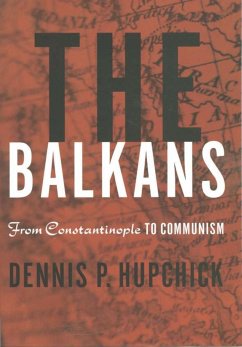
Notions of Violence and Ethnic Cleansing on the Eve of the First World War
The Balkan Wars of 1912-13
Herausgegeben: Dragnea, Ani_oara
Versandkostenfrei!
Versandfertig in 6-10 Tagen
84,95 €
inkl. MwSt.
Weitere Ausgaben:

PAYBACK Punkte
0 °P sammeln!
This book examines patterns of behavior during an era of mass brutality by analyzing, in a transnational context, mechanisms of violence and ethnic cleansing in the Balkan Wars of 1912-13. The main goal is to incorporate these conflicts into the broader discussion of the Greater War (1917-1923), thereby challenging western, Eurocentric dominance of historiography about the First World War. In contrast to earlier works of the political, diplomatic, and military history of the Balkan Wars, this book deals with what took place behind the front lines. Panagiotis Delis explores interactions between...
This book examines patterns of behavior during an era of mass brutality by analyzing, in a transnational context, mechanisms of violence and ethnic cleansing in the Balkan Wars of 1912-13. The main goal is to incorporate these conflicts into the broader discussion of the Greater War (1917-1923), thereby challenging western, Eurocentric dominance of historiography about the First World War. In contrast to earlier works of the political, diplomatic, and military history of the Balkan Wars, this book deals with what took place behind the front lines. Panagiotis Delis explores interactions between the regular army, irregulars, and local civilians, and discusses how the collective experience of war generated an undeclared 'war on the sidelines'.
The Balkan Wars: Notions of Violence and Ethnic Cleansing on the Eve of the First World War is a fascinating new assessment of an important but often neglected conflict. It is also a major new contribution to our understanding of the mechanisms of violence and ethnic cleansing.
The Balkan Wars have a special place in the history of twentieth-century violence and one that is not often recognised in Western scholarship. As Panagiotis Delis shows in his excellent book, many of the logics and practices of violence that came to dominate in Europe between 1914 and 1945 were anticipated in the Balkan Wars.
-Robert Gerwarth, Professor, Director, UCD Centre for War Studies
This is a rigorously researched and masterfully analyzed study of violence at the local level, offering an indispensable comparative perspective on several Balkan borderlands.
-Theodora Dragostinova, Professor of History, The Ohio State University
Panagiotis Delis holds a PhD in history from Simon Fraser University. He serves as a permanent civil servant and as research associate at the University of Athens.
The Balkan Wars: Notions of Violence and Ethnic Cleansing on the Eve of the First World War is a fascinating new assessment of an important but often neglected conflict. It is also a major new contribution to our understanding of the mechanisms of violence and ethnic cleansing.
The Balkan Wars have a special place in the history of twentieth-century violence and one that is not often recognised in Western scholarship. As Panagiotis Delis shows in his excellent book, many of the logics and practices of violence that came to dominate in Europe between 1914 and 1945 were anticipated in the Balkan Wars.
-Robert Gerwarth, Professor, Director, UCD Centre for War Studies
This is a rigorously researched and masterfully analyzed study of violence at the local level, offering an indispensable comparative perspective on several Balkan borderlands.
-Theodora Dragostinova, Professor of History, The Ohio State University
Panagiotis Delis holds a PhD in history from Simon Fraser University. He serves as a permanent civil servant and as research associate at the University of Athens.














